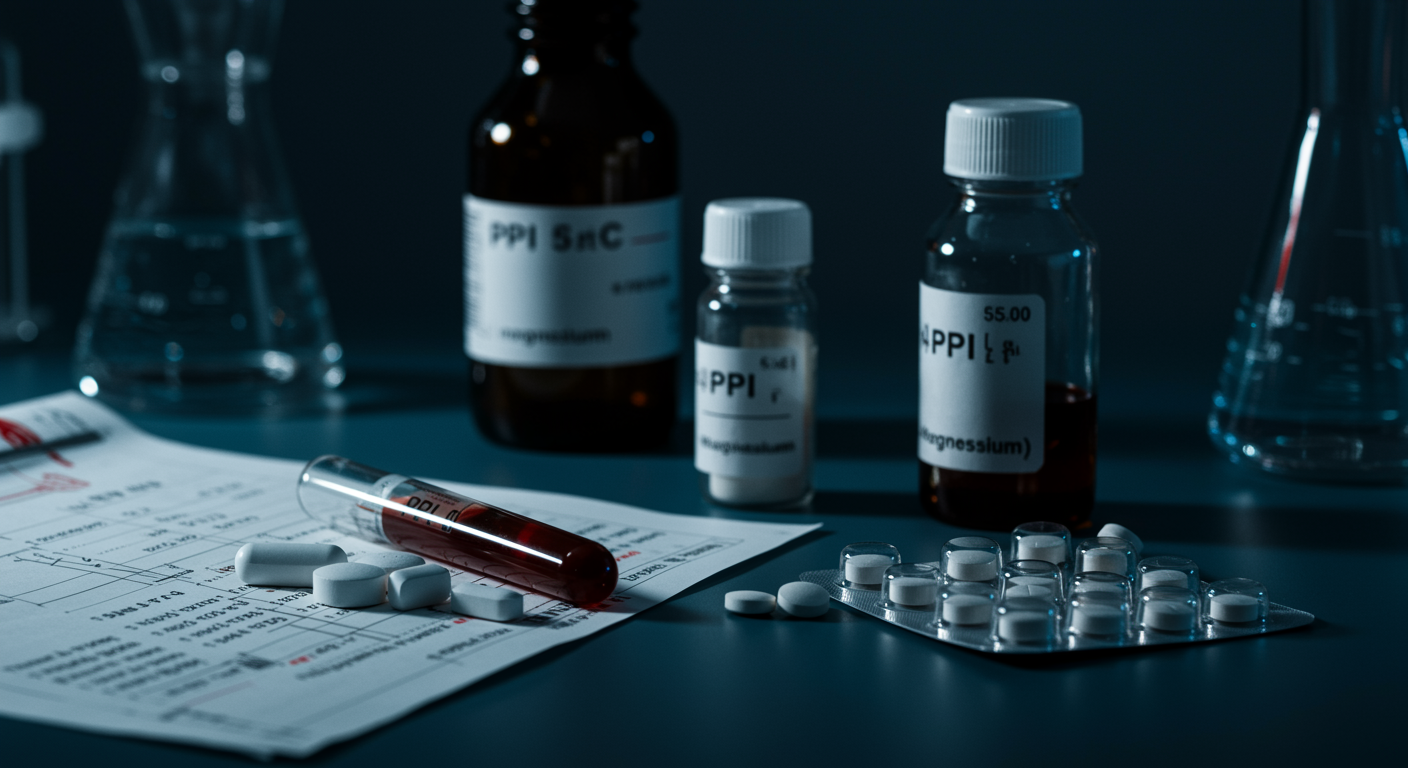Do Proton Pump Inhibitors Cause Dangerous Magnesium Deficiency?
Yes, proton pump inhibitors significantly increase the risk of hypomagnesemia (low magnesium levels) by 43% according to this comprehensive meta-analysis. The increased risk results from PPI-induced impairment of magnesium absorption in the intestines, particularly affecting patients on long-term therapy, and can lead to serious complications including muscle cramps, seizures, and cardiac arrhythmias.
Dr. Kumar’s Take
This meta-analysis provides solid evidence for another important PPI nutritional consequence. A 43% increased risk of magnesium deficiency is clinically significant because low magnesium can cause serious symptoms - muscle cramps, weakness, irregular heartbeats, and even seizures. What’s particularly concerning is that magnesium deficiency can be subtle initially, and by the time symptoms appear, levels may be quite low. This reinforces the importance of monitoring electrolytes in long-term PPI users and considering magnesium supplementation when appropriate.
What the Research Shows
This systematic review and meta-analysis examined multiple observational studies investigating the relationship between PPI use and hypomagnesemia risk. The analysis included case-control studies, cohort studies, and cross-sectional analyses from various healthcare settings and populations to provide robust evidence for this association.
The research demonstrated a consistent relationship between PPI therapy and increased hypomagnesemia risk across different study designs, populations, and geographic regions, suggesting a causal relationship rather than mere association.
Study Snapshot
The meta-analysis included 9 observational studies encompassing over 100,000 participants from multiple countries and healthcare systems. Studies examined various PPI types, dosing regimens, and treatment durations while controlling for potential confounding factors like age, comorbidities, and concurrent medications.
Results in Real Numbers
- Overall hypomagnesemia risk increase: 43% higher with PPI use (OR 1.43, 95% CI 1.08-1.88)
- Duration-dependent risk: 2-fold higher risk with >1 year of PPI therapy
- Dose-response relationship: Higher daily PPI doses associated with greater risk
- Severe hypomagnesemia: 3-fold increased risk of magnesium <1.2 mg/dL
- Time to deficiency: Median 5.5 years from PPI initiation to hypomagnesemia diagnosis
- Recovery after discontinuation: 75% normalize magnesium levels within 2-8 weeks of PPI cessation
Safety, Limits, and Caveats
The meta-analysis was limited by heterogeneity in study designs, PPI dosing regimens, and magnesium measurement methods across included studies. Some studies didn’t adequately control for dietary magnesium intake, kidney function, or other medications that might affect magnesium levels.
Additionally, the analysis couldn’t determine optimal monitoring intervals or identify specific patient populations at highest risk for PPI-induced hypomagnesemia beyond duration and dose relationships.
Practical Takeaways
- Monitor magnesium levels in patients on long-term PPI therapy, especially those on high doses
- Consider magnesium supplementation for PPI users at risk for deficiency
- Be aware that hypomagnesemia can cause muscle cramps, weakness, and cardiac arrhythmias
- Use the lowest effective PPI dose and shortest duration necessary for symptom control
- Educate patients about magnesium-rich foods and potential deficiency symptoms
- Consider PPI discontinuation if severe hypomagnesemia develops and cannot be corrected with supplementation
Related Studies and Research
- Use of Proton Pump Inhibitors and Risk of Iron Deficiency: Population-Based Study
- Vitamin B12 Intake From Animal Foods, Biomarkers, and Health Aspects
- Acute Interstitial Nephritis Due to Proton Pump Inhibitors
- Proton Pump Inhibitors and Risk of Fractures: Meta-Analysis of 11 International Studies
- Episode 25: The Great GERD Mistake - How Medicine Made Heartburn Worse and How to Fix It
FAQs
How do PPIs cause magnesium deficiency?
PPIs may impair magnesium absorption in the small intestine by affecting transporter proteins and altering the intestinal environment needed for optimal magnesium uptake.
What are the symptoms of magnesium deficiency I should watch for?
Early symptoms include muscle cramps, weakness, fatigue, and irritability, while severe deficiency can cause seizures, irregular heartbeats, and personality changes.
How often should magnesium levels be checked in PPI users?
While specific guidelines vary, many experts recommend baseline testing and periodic monitoring, especially for patients on long-term or high-dose PPI therapy.
Can magnesium supplements prevent PPI-induced deficiency?
Magnesium supplementation may help maintain normal levels in PPI users, though the optimal dose and formulation should be determined with healthcare provider guidance.
Will stopping PPIs reverse magnesium deficiency?
Most patients (75%) normalize magnesium levels within 2-8 weeks of PPI discontinuation, though some may need continued supplementation depending on baseline status and other factors.
Bottom Line
Proton pump inhibitors increase hypomagnesemia risk by 43% through impaired intestinal magnesium absorption. This significant metabolic consequence requires awareness, appropriate monitoring, and consideration of supplementation in long-term PPI users to prevent serious complications.


